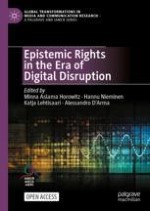This open-access volume argues that in a functioning democracy, citizens should be equally capable of making informed choices about matters of social importance. This includes citizens accessing all relevant information and knowledge necessary for informed will formation. In today's complex era of digital disruption, it is not enough to simply speak about communication or even digital rights. The starting point for this volume is the need for 'epistemic equality'.
The contributors seek to showcase the history and diversity of current debates around communication and digital rights, as precursors for the need for epistemic rights; both as a theoretical concept and an empirically assessed benchmark. The book highlights scholarship via academic case studies from around the world to feature different issues and methodological approaches, as well as similarities in academic and policy challenges across the globe.
The goal is to provide an overview of issues that depict challenges to epistemic rights, extract both academic and applied policy implications of different approaches, and end with a set of recommendations for advancing policy-relevant scholarship on epistemic rights. This volume is intended as the first holistic response to an urgent need to address epistemic rights of communication as a central public policy issue, as an academic analytical concept, as well as a central theme for informed public debate.
This book is open-access, meaning you have free and unlimited access.
